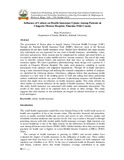| dc.description.abstract | The government of Kenya plans to largely finance Universal Health Coverage (UHC)
through the National Health Insurance Fund (NHIF). However, most of the Kenyan
population do not have health insurance cover. Studies have identified four main reasons
why individuals are not registered for any form of health insurance: affordability, value,
relevance and process. These reasons may be complicated by cultural and social beliefs, as
revealed by studies done in other middle and low- income countries. The aim of this study
was to describe cultural beliefs and practices that may have an influence on health
insurance uptake. We used a qualitative phenomenology study design over a period of 3
months at Chogoria Mission Hospital. The study used purposive sampling to recruit
participants from inpatient and outpatient departments. Through 20 in-depth interviews
using a semi structured design and utilizing the constant comparative method of analysis,
we identified the following themes: Chieftaincy, religious beliefs that purchasing health
insurance is a lack trust in the healing power of God and calling bad omen, patriarchal
culture, traditional medicine use, peer influence in purchasing insurance and Harambe as
factors that might have an influence on health insurance uptake. This study affirms the
other studies on cultural influence on the uptake of health insurance. However, unique to
this study; health insurance was associated with family and community dissociation. The
results of this study need to be explored more in details in other settings. This study
suggests that most reasons of non-enrolment are hinged on cultural motivation at various
level and degrees. | en_US |

